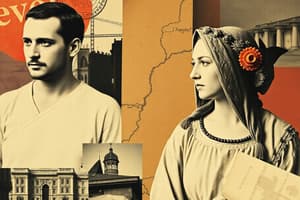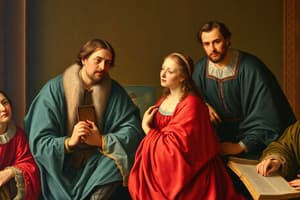Podcast
Questions and Answers
Galileo's conflict with the Roman Catholic Church primarily stemmed from which of his beliefs?
Galileo's conflict with the Roman Catholic Church primarily stemmed from which of his beliefs?
- Natural Philosophy
- Geocentrism
- Atomism
- Heliocentrism (correct)
Galileo was celebrated by the Roman Catholic Church during his lifetime.
Galileo was celebrated by the Roman Catholic Church during his lifetime.
False (B)
What is one of the key values promoted during the Scientific Revolution?
What is one of the key values promoted during the Scientific Revolution?
Evidence-based inquiry
The emphasis on _ and skepticism during the Enlightenment was a reaction to traditional authority.
The emphasis on _ and skepticism during the Enlightenment was a reaction to traditional authority.
Match the following terms with their descriptions:
Match the following terms with their descriptions:
Which of the following rights did the Napoleonic Code protect?
Which of the following rights did the Napoleonic Code protect?
Napoleon's regime was characterized by an increase in individual liberties for the citizens of France.
Napoleon's regime was characterized by an increase in individual liberties for the citizens of France.
What event led to Napoleon's exile in 1815?
What event led to Napoleon's exile in 1815?
_____ believed that the role of government was to protect natural rights and that people have the right to revolt if their rights are not upheld.
_____ believed that the role of government was to protect natural rights and that people have the right to revolt if their rights are not upheld.
Match the Enlightenment thinkers with their contributions:
Match the Enlightenment thinkers with their contributions:
What event marked the end of fighting between the colonists and the British Army?
What event marked the end of fighting between the colonists and the British Army?
The Constitution created a combined national government with no system of checks and balances.
The Constitution created a combined national government with no system of checks and balances.
In what year was the Treaty of Paris signed, recognizing the colonists' independence from Britain?
In what year was the Treaty of Paris signed, recognizing the colonists' independence from Britain?
The three branches of the national government as outlined in the Constitution are Legislative, Executive, and ______.
The three branches of the national government as outlined in the Constitution are Legislative, Executive, and ______.
Match the Estates of French society with their descriptions:
Match the Estates of French society with their descriptions:
What was the role of Cardinal Richelieu during Louis XIII's reign?
What was the role of Cardinal Richelieu during Louis XIII's reign?
Louis XIV's reign lasted for 100 years.
Louis XIV's reign lasted for 100 years.
What symbol did Louis XIV choose to represent himself?
What symbol did Louis XIV choose to represent himself?
Louis XIV became king when he was ___ years old.
Louis XIV became king when he was ___ years old.
Match the following French kings with their key advisors:
Match the following French kings with their key advisors:
What was the primary concern of humanists like Erasmus regarding the Roman Catholic Church?
What was the primary concern of humanists like Erasmus regarding the Roman Catholic Church?
Indulgences were a way to receive forgiveness without any conditions.
Indulgences were a way to receive forgiveness without any conditions.
What document did Martin Luther create to express his grievances against the Catholic Church?
What document did Martin Luther create to express his grievances against the Catholic Church?
The Church controlled about _____ of all the land in Europe during the Medieval period.
The Church controlled about _____ of all the land in Europe during the Medieval period.
Which of the following was NOT a way the Catholic Church made money during the Medieval period?
Which of the following was NOT a way the Catholic Church made money during the Medieval period?
Match the terms with their appropriate definitions:
Match the terms with their appropriate definitions:
The sale of indulgences became controversial because it was viewed as a fair practice.
The sale of indulgences became controversial because it was viewed as a fair practice.
What lifestyle issue did many Church officials face during the Medieval period?
What lifestyle issue did many Church officials face during the Medieval period?
What led to the start of the Thirty Years' War?
What led to the start of the Thirty Years' War?
John Calvin established a theocracy in Geneva, Switzerland.
John Calvin established a theocracy in Geneva, Switzerland.
Who was given the title 'Defender of the Faith' by the Pope?
Who was given the title 'Defender of the Faith' by the Pope?
Henry VIII created the ______ Church after breaking away from Catholicism.
Henry VIII created the ______ Church after breaking away from Catholicism.
Which of Henry VIII's wives was executed?
Which of Henry VIII's wives was executed?
Mary I attempted to restore Protestant reforms in England.
Mary I attempted to restore Protestant reforms in England.
What was the nickname given to Mary I due to her persecution of Protestants?
What was the nickname given to Mary I due to her persecution of Protestants?
During the Catholic Reformation, the ______ was established to address concerns brought up by Protestant reformers.
During the Catholic Reformation, the ______ was established to address concerns brought up by Protestant reformers.
What was one effect of the Protestant Reformation on the authority of the Church?
What was one effect of the Protestant Reformation on the authority of the Church?
Match the following monarchs with their actions during the Reformation:
Match the following monarchs with their actions during the Reformation:
The Roman Inquisition was established to promote Protestantism.
The Roman Inquisition was established to promote Protestantism.
What invention helped spread Martin Luther's ideas quickly throughout Europe?
What invention helped spread Martin Luther's ideas quickly throughout Europe?
The Protestant Reformation resulted in Europe being divided into Catholic and ______ states.
The Protestant Reformation resulted in Europe being divided into Catholic and ______ states.
What was the main purpose of the Catholic Counter-Reformation?
What was the main purpose of the Catholic Counter-Reformation?
Flashcards
Indulgence
Indulgence
A pardon purchased from the Catholic Church that supposedly releases a person from punishment for their sins.
95 Theses
95 Theses
Martin Luther's list of 95 complaints against the Catholic Church, particularly criticizing the selling of indulgences.
Excommunicate
Excommunicate
To officially exclude someone from participating in the sacraments and services of the Christian Church.
The Church's Power in Medieval Europe
The Church's Power in Medieval Europe
Signup and view all the flashcards
Church's financial practices
Church's financial practices
Signup and view all the flashcards
Church's lavish spending
Church's lavish spending
Signup and view all the flashcards
Church officials' corruption
Church officials' corruption
Signup and view all the flashcards
Lower Church official's corruption
Lower Church official's corruption
Signup and view all the flashcards
Divine Right of Kings
Divine Right of Kings
Signup and view all the flashcards
Cardinal Richelieu
Cardinal Richelieu
Signup and view all the flashcards
Palace of Versailles
Palace of Versailles
Signup and view all the flashcards
Absolutism
Absolutism
Signup and view all the flashcards
War of Spanish Succession
War of Spanish Succession
Signup and view all the flashcards
Scientific Revolution
Scientific Revolution
Signup and view all the flashcards
Scientific Method
Scientific Method
Signup and view all the flashcards
Enlightenment
Enlightenment
Signup and view all the flashcards
Philosopher
Philosopher
Signup and view all the flashcards
Separation of Powers
Separation of Powers
Signup and view all the flashcards
The U.S. Constitution
The U.S. Constitution
Signup and view all the flashcards
Checks and Balances
Checks and Balances
Signup and view all the flashcards
Legislative Branch
Legislative Branch
Signup and view all the flashcards
Executive Branch
Executive Branch
Signup and view all the flashcards
Judicial Branch
Judicial Branch
Signup and view all the flashcards
Napoleonic Code
Napoleonic Code
Signup and view all the flashcards
Despotism
Despotism
Signup and view all the flashcards
Battle of Waterloo
Battle of Waterloo
Signup and view all the flashcards
Social Contract
Social Contract
Signup and view all the flashcards
Protestant Reformation
Protestant Reformation
Signup and view all the flashcards
Theocracy
Theocracy
Signup and view all the flashcards
John Calvin
John Calvin
Signup and view all the flashcards
King Henry VIII
King Henry VIII
Signup and view all the flashcards
Catherine of Aragon
Catherine of Aragon
Signup and view all the flashcards
Act of Supremacy
Act of Supremacy
Signup and view all the flashcards
Edward VI
Edward VI
Signup and view all the flashcards
Mary I
Mary I
Signup and view all the flashcards
Elizabeth I
Elizabeth I
Signup and view all the flashcards
Catholic Counter Reformation
Catholic Counter Reformation
Signup and view all the flashcards
Roman Inquisition
Roman Inquisition
Signup and view all the flashcards
The Council of Trent
The Council of Trent
Signup and view all the flashcards
Thirty Years' War
Thirty Years' War
Signup and view all the flashcards
Erasmus
Erasmus
Signup and view all the flashcards
Study Notes
Renaissance
- The Renaissance was a period of cultural change, beginning in Italy in the 1300s and spreading through Europe.
- It literally means "rebirth" due to its emphasis on ancient Greek and Roman culture.
- Key characteristics included artistic creativity, political, social, economic, and cultural change, and a renewed focus on classical learning.
- Two distinct periods: Italian (1300-1600) and Northern (1450-1600).
- Florence, a prominent Italian city-state, was a republic with a powerful merchant class and influential Medici family.
- Humanism, a focus on human potential rather than divine matters, influenced education and artistic expression.
- Patrons supported artists, writers, and institutions, enabling the flourishing of creativity.
- The printing revolution, with Johannes Gutenberg's invention of the printing press, made books more accessible and cheaper, leading to a wider dissemination of information.
Cause of the Renaissance and their Effects on the Reformation
- Humanism's focus on human experience and critical thinking, and the printing press's role in wider knowledge dissemination, laid a foundation for challenges to the Catholic Church's authority.
- Corruption within the Church, poor clergy education, and political influence fueled calls for reform.
- Local rulers' increased power challenged the Church's influence.
- These factors contributed to the Reformation.
Studying That Suits You
Use AI to generate personalized quizzes and flashcards to suit your learning preferences.




